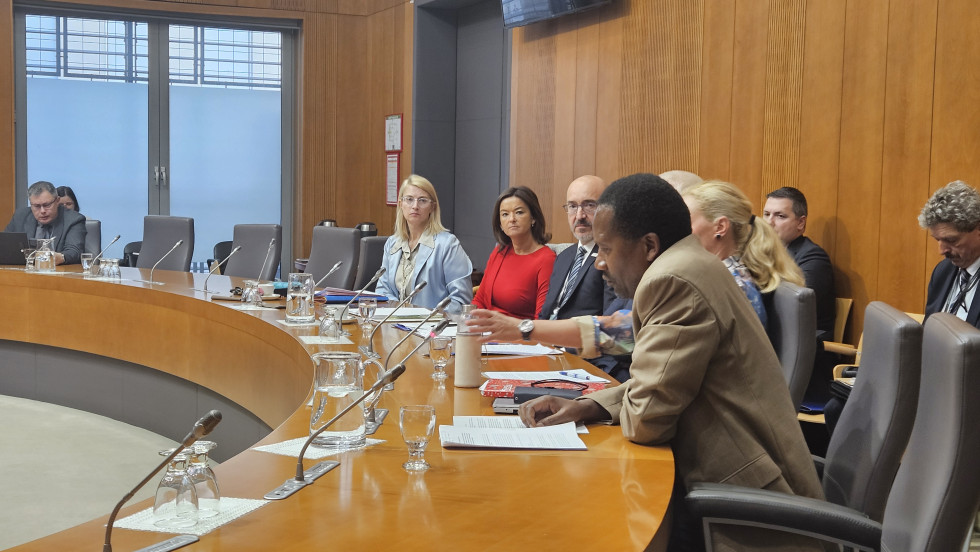Minister Fajon: Slovenia's development and humanitarian engagement make it a respected and reputable partner

Minister Fajon and Coordinator of the Sloga NGO platform Max Zimani | Author Ministry of Foreign and European Affairs
Minister Fajon began by noting that Slovenia had allocated a total of 153 million euros to development cooperation and humanitarian aid last year, amounting to 0.23% of gross national income (GNI). She acknowledged that this figure falls short of our commitment to reach 0.33% of GNI by 2030. Despite limited resources, she explained that Slovenia is characterised by speed, efficiency and flexibility, particularly in a year of challenging humanitarian situations and geopolitical tensions. "Slovenia provided the necessary assistance – three times more than in 2021 – to Palestine and Ukraine, while also addressing long-standing and overlooked crises in countries such as Syria and Afghanistan. Together, we are creating beautiful stories of solidarity. Last year, through our strategic partner Caritas Slovenia, we provided emergency humanitarian aid to almost 38,000 vulnerable people, from Ukraine and Palestine to Madagascar, Lebanon and Bosnia and Herzegovina," she said.
The Slovenian Foreign Minister announced that Slovenia is strengthening its partnerships with programme countries, including Montenegro and North Macedonia, as well as with selected international organisations and Slovenian partners. In line with the OECD DAC recommendations, Slovenia has begun channelling aid to select countries in sub-Saharan Africa, including Kenya and Madagascar, and has also strengthened its cooperation with Moldova in the Eastern Neighbourhood.
"Slovenia is a respected and trustworthy country due to its development activities and humanitarian engagement. By providing assistance, we play our part in taking responsibility for the future, for the security and prosperity of us all," Minister Fajon underlined. She added that we also create more favourable conditions for our economic actors in these countries, who then improve economic and social conditions through their activities and investments. The Ministry is therefore striving to strengthen and increase the involvement of the Slovenian economy in development partnerships. Numerous discussions on this topic are currently taking place as part of the Slovenian Development Days.
In conclusion, Minister Fajon called on deputies to increase funding for humanitarian aid and development cooperation. "For Slovenia, development cooperation and humanitarian aid remain important instruments of solidarity, sustainable development and foreign policy. We will continue to act responsibly and as a reliable partner within the international community. We will also strive to become even more effective and innovative. This commitment is not only due to record-high humanitarian needs, but also to the growing trend of reducing funds for official development assistance. It is therefore essential that we work together to fulfil the 0.33% GNI commitment."
The representatives of organisations actively engaged in the fields of humanitarian aid and development cooperation in attendance at the event joined the Minister's appeal. "Development cooperation is not a cost, but an investment. Every euro invested in crisis prevention, resilience building and sustainable development reduces the need for humanitarian response in the long term. Slovenia has the knowledge, experience and networks that can contribute significantly to Sustainable Development Goals, especially in areas of our expertise. Development cooperation and humanitarian aid are more than a question of justice or political obligation – they are a question of humanity," emphasised Max Zimani, Coordinator of the Sloga NGO platform.
Nina Čepon, Director of the Centre for European Perspective, speaking also on behalf of the Center of Excellence in Finance (CEF), the Centre for International Cooperation and Development (CMSR), and ITF Enhancing Human Security, underlined that in a world where leading Western democracies are turning away from global development, it is crucial for Slovenia to maintain the consensus that global development is our shared responsibility and, ultimately, an investment in our country's future and that of future generations. She noted that these organisations are currently facing challenges that call for continued support through state policy, including in the areas of raising awareness and professionalisation.
According to Peter Tomažič, Secretary General at Caritas Slovenia, the organisation's strategic partnership with the Ministry in the field of humanitarian aid is successful. Slovenia's efforts in this domain are effective and internationally recognised, with a positive impact at home, raising awareness and fostering global solidarity. "We offer people, particularly young people in affected areas, prospects for a better life, particularly as they want to work and contribute to their societies. We can further strengthen our efforts with investments from companies as well as state funds," he concluded.

